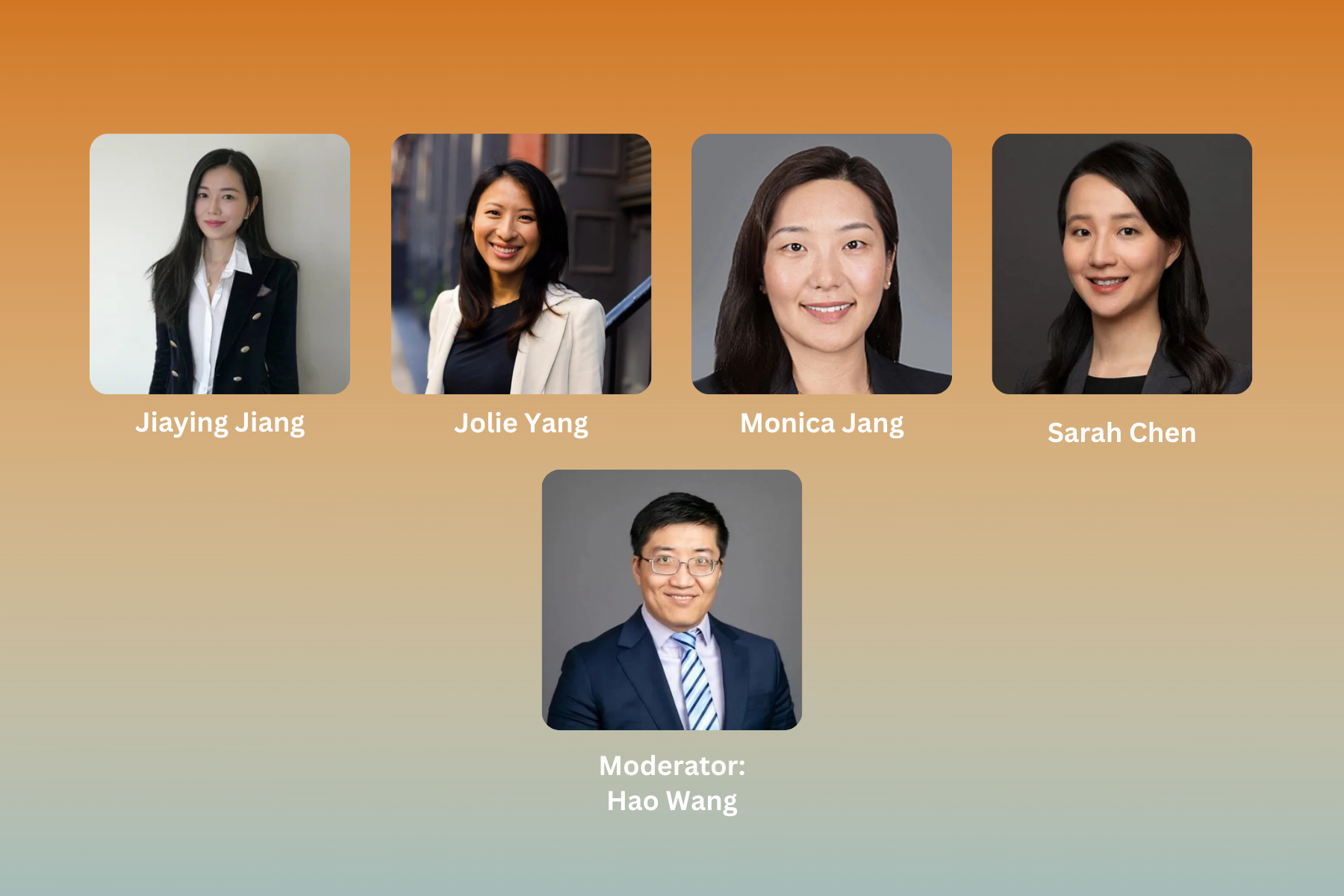
Breaking the (Block)chain: Women at the Forefront of Crypto Law & Regulation - Room W401
Speakers
Jiaying Jiang - Associate Professor of Law, University of Florida Levin College of Law
Jolie Yang, Assistant General Counsel, Uniswap Labs
Monica Jang, Of Counsel, Paul Hastings
Sarah Chen, Partner, Cahill Gordon & Reindel LLP
Moderator
Hao Wang, JD Student, Columbia Law School
Description
As blockchain technology and digital assets continue to evolve, lawyers and regulators are racing to keep pace with innovation. This panel brings together leading women practitioners in crypto law and regulation to demystify the legal framework governing cryptocurrency and blockchain, clarify key terminology, and highlight the latest developments under the current administration.
Panelists will share insights into how blockchain is being applied across industries today, as well as the challenges and opportunities created by emerging regulatory trends. They will also draw from their own career paths and personal experiences to discuss how they entered this cutting-edge field, offering practical advice for law students and aspiring lawyers who want to build a future in crypto law.
From “war stories” in navigating novel legal questions to strategies for staying ahead of regulatory change, this conversation will provide both a foundation in crypto regulation and inspiration from trailblazing women at the forefront of this space.
Approved for 1.5 Areas of Professional Practice credits(Transitional and non-transitional).
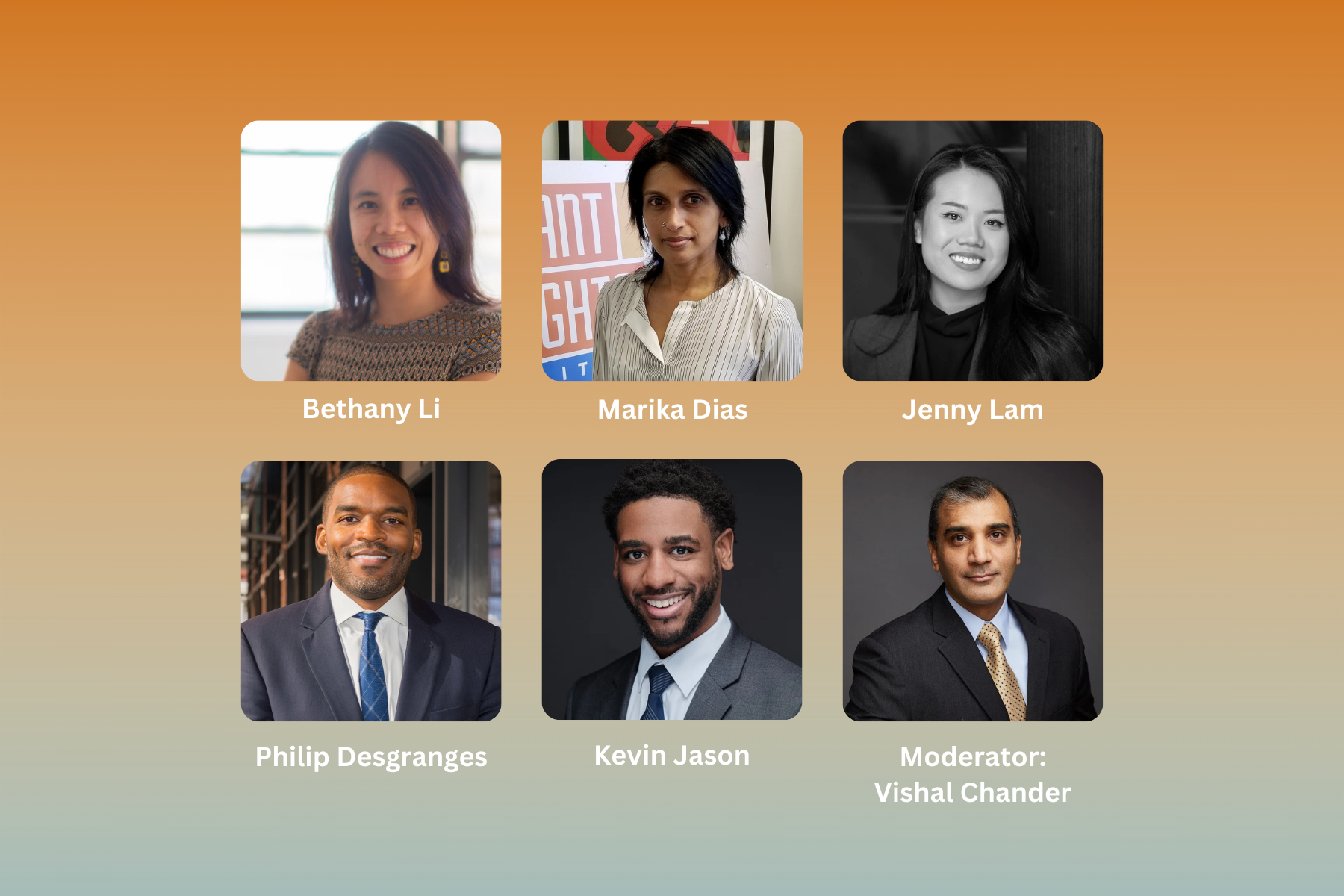
People Power! How Movement Lawyering Strengthens Democracy While Pushing For Systemic Change - Room W420
Speakers
Bethany Li, Executive Director, Asian American Legal Defense & Education Fund
Marika Dias, Managing Director, Urban Justice Center
Jenny Lam, Associate, Cohen, Weiss and Simon LLP
Philip Desgranges, Attorney-In-Charge, Legal Aid Society
Kevin Jason, Deputy Director, NAACP Legal Defense Fund, Inc
Moderator
Vishal Chander, Managing Attorney, The Chander Law Firm
Description
The return of the Trump Administration in 2025 has resulted in political turmoil and persecution across the country, creating a climate of fear and challenges to our democracy and the rule of law. At the same time, a movement of resistance against the administration has grown across the country with mass protests and legal challenges occurring on a regular basis.
This program will explore “movement lawyering” for legal professionals and law students interested in activism, including the following questions:
1. How can we come together to protect one another in a time of increasing economic inequality and political repression?
2. How should we use our legal knowledge and skills whether at work or in the community to resist and push for systemic change?
3. How do we counteract the challenges and elimination of the concepts of diversity, equity and inclusion?
Approved for 1.5 Diversity and Elimination of Bias credits (Non-transitional ONLY).

Everyday Law for Community Empowerment Part 2: Housing, Trusts and Estates, and Family Law - Room W402
Speakers
Benjamin Choi, Court Attorney, New York City Housing Court
Natasha Chang, Staff Attorney, White and Case
Helen Wu, Manager, Family Law, Womankind
Moderator
Justin Lee, Associate, Kelley Drye and Warren
Description
Being a New Yorker often means navigating a range of housing-related challenges. The complexity of housing, the need to plan for the family, and the possible property division in divorce all highlight the importance of ensuring the AANHPI community has access to sound legal guidance. Part 2 of this program equips attorneys with the tools to better advise clients on both sides of landlord-tenant disputes, property transfers across generations, and divorce-related property issues. Completing the cluster of six topics that this panel series covers aims to give lawyers what they need to start tackling the legal issues that are most prevalent in the AANHPI community.
Approved for 1.5 Credit for Professional Practice credits (Transitional and non-transitional).

Immigration Landscape in 2025: Navigating Challenges and Strategies for Businesses and Individuals - Room W420
Speakers
Zhixian Liu, Partner, Z Liu Law Group, P.C.
Susan Song, Senior Associate, Fragomen, Del Rey, Bernsen & Loewy, LLP
Rose Cuison-Villazor, Professor of Law, Rutgers Law School
Moderator
Gaurav Mukherjee, Visiting Assistant Professor of Law, UConn School of Law
Description
With the second Trump Administration, U.S. immigration policy is undergoing sweeping changes through executive orders, presidential memoranda, and agency rulemaking. These developments are reshaping the landscape of immigration law and practice, impacting both individual and corporate stakeholders. This program, offered jointly by the Immigration Law Committee and the Academic Committee, will offer a timely overview of the evolving legal and policy environment and assess its real-world implications for immigrant communities and legal practitioners. In addition to practical insights from immigration lawyers, the program will feature law professors who will provide a broader academic and constitutional perspective, offering context on the legal theories, due process implications, and potential litigation trajectories stemming from Trump-era immigration policies.
Topics to be discussed include:
Overview of the H-1B Presidential Proclamation – summary of provisions and impact.
One Big Beautiful Bill and the immigration and border enforcement
Due Process for Immigrants: Ongoing legal challenges to expedited removal, credible fear screenings, and the erosion of procedural protections in immigration courts.
Visa Adjudication Trends: Increased scrutiny and delays in the adjudication of both immigrant and nonimmigrant visas, and how changing standards affect businesses and individuals alike.
Corporate Compliance in Uncertain Times: Strategic guidance for business clients navigating evolving compliance obligations, site visits, and audits.
Red Flags at the Border: Advising clients facing heightened travel restrictions, CBP’s expanded discretionary powers at ports of entry, and the growing use of digital device searches.
Impacts on Individuals and Families: A focus on F-1 visa revocations, the role of nationwide injunctions, and federal court litigation involving DACA, TPS, and parole programs.
Investment-Based Immigration: The future of the EB-5 visa program and analysis of emerging proposals such as a U.S. “gold card.”
Humanitarian Pathways Under Threat: Legislative and executive branch developments affecting asylum, humanitarian parole, TPS, and refugee admissions.
AANHPI Communities and Structural Disparities: How immigration policy shifts under Trump 2.0 are uniquely impacting Asian American, Native Hawaiian, and Pacific Islander communities legally, politically, and socially.
The panel aims to bridge practice and theory, offering a nuanced understanding of how legal rules, enforcement discretion, and political rhetoric converge to shape immigration outcomes.
Approved for 1.5 Areas of Professional Practice credits (Transitional and Non-Transitional).
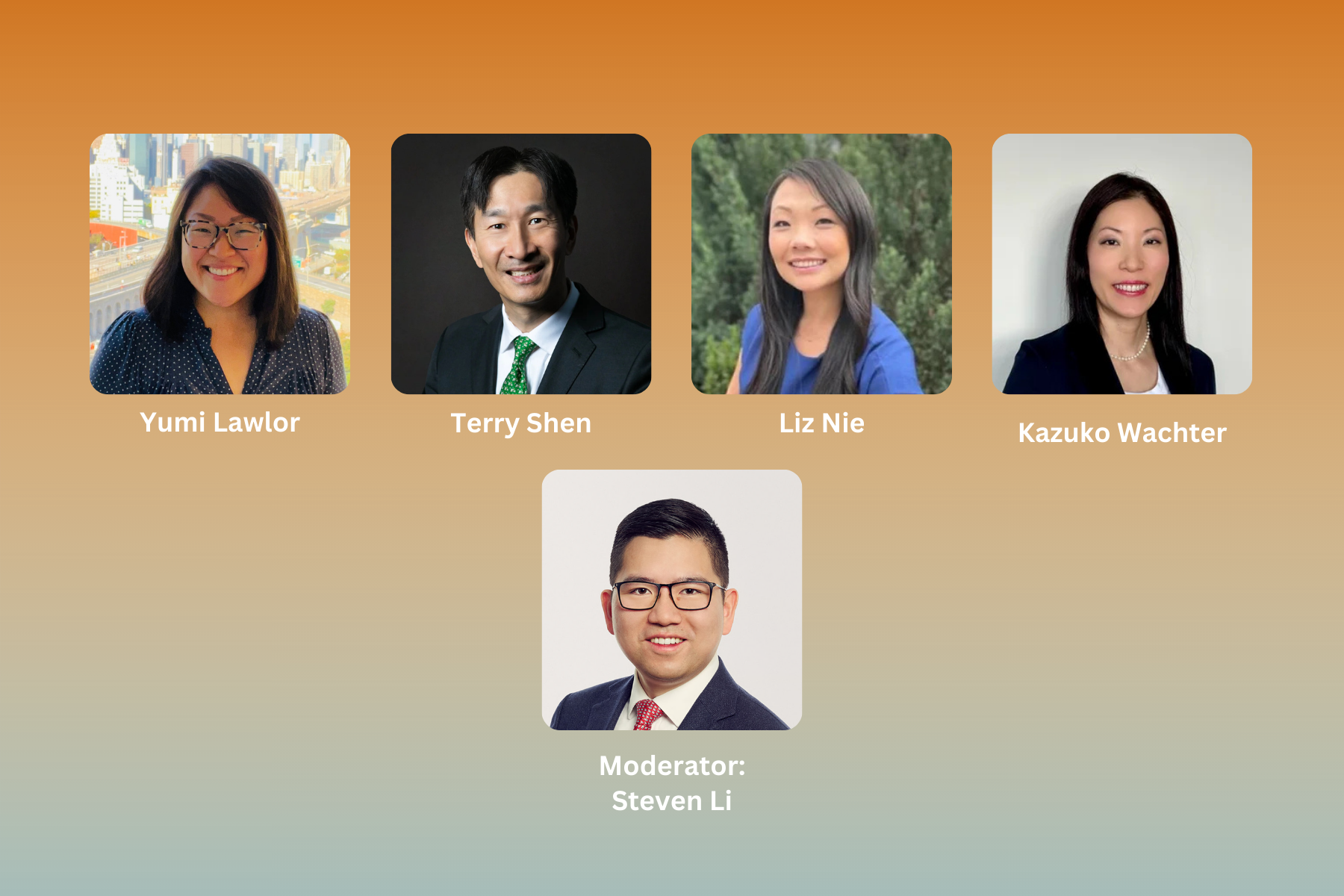
General Counsel Roundtable - Room W401
Speakers
Yumi Lawlor, Head of Legal, Shop My Shelf, Inc.
Terry Shen, General Counsel, ISS STOXX
Liz Nie, General Counsel & Corporate Secretary, Acorns Grow
Kazuko Wachter, General Counsel and Corporate Secretary, EquiLend
Moderator
Steven Li, Partner, Freshfields
Description
The General Counsel Roundtable Panel will explore the career paths of esteemed General Counsels within innovative and cutting-edge companies at the intersection of financial services and technology. Drawing on personal and professional experiences with respect to their path to becoming a General Counsel, the panelists will share strategies for cultivating the skills to signal that you are “leadership-ready.”
Approved for 1.5 Law Practice Management credits (Non-transitional ONLY).

Everyday Law for Community Empowerment Part 1: Immigration, Employment, and Small Claims - Room W402
Speakers
Yen-Yi Anderson, Managing Principal, Anderson & Associates Law, PC
David Mou, Founder, Mou Legal PLLC
Kwok Kei Ng, Court Attorney, New York State Unified Court System
Moderator
Gary Yeung, Associate, McDermott Will & Schulte
Description
Members of the New York AANHPI community often face deep uncertainty when dealing with immigration and employment disputes or when someone sues them for money. These challenges threaten the lives they have worked hard to build, and community members need legal resources to forcefully advocate for their rights. This program will equip lawyers with the tools to effectively advise clients on common immigration matters, employment discrimination, and monetary matters such as small claims. By training lawyers, we help empower the community to advocate for itself. Through education, this program increases the power of “us”; not only as AANHPI lawyers, but as a united AANHPI community to do good.
Approved for 1.5 Credit for Professional Practice credits (Transitional and non-Transitional).

AABANY Trial Reenactment - Race, Color, and Citizenship: Ozawa and Thind In the 1920s
Speakers
Hon. Pamela Chen, Eastern District of New York
Hon. Karen M.C. Cortes, Bronx County Family Court
Hon. Judy Kim, New York State Supreme Court, New York County
Hon. Peggy Kuo, Eastern District of New York
Hon. Karen Lin, New York State Supreme Court
Hon. Soma Syed, Queens County Civil Court
Hon. Lillian Wan, Associate Justice, Appellate Division, Second Department
Hon. Frances Wang, Queens Supreme Court
Hon. Ona T. Wang, Southern District of New York
Vishal Chander, Managing Attorney, The Chander Law Firm
Becky Chen, Assistant Law Clerk, Appellate Division, Second Department
Francis Chin, Senior Systems Engineer, K2 Services
Rose Cuison-Villazor, Professor of Law and Chancellor’s Social Justice Scholar at Rutgers Law School
Gracie Iwersen, Student, Seton Hall University School of Law
Hassan Jamil, Law Clerk, Malapero Prisco & Klauber LLP
Eliana Yuna Jeong, Student, Columbia University
Emily Kam, Student, Columbia University
Charlotte Kim, Student, Fordham School of Law
Mirai Kim, Student, Seton Hall University School of Law
Emily Lai, Student, Albany Law School
Margaret Ling, NYS Agency Underwriting Counsel, Education Director and Agency Business Development, Amtrust Title Insurance Company
Kwok Kei Ng, Court Attorney, New York State Unified Court System
Jameson Xu, Principal, Law Offices of Jameson Xu PLLC
Cecilia Yang, Vice Chair, AABANY Young Lawyers Committee
Gary Yeung, Associate, McDermott Will & Schulte
Ariel Zhang, Student, St. John’s University School of Law
Moderator
Albert Tong, Student, Brooklyn Law School
Description
This program is an AABANY Trial Reenactment of Ozawa v. U.S. (1922) and U.S. v. Bhagat Singh Thind (1923), two landmark Supreme Court cases that denied Asian immigrants the right to naturalized citizenship based on race.
Ozawa and Thind reveal how American citizenship was shaped by racial boundaries rather than equality. Ozawa’s appeal to cultural assimilation and Thind’s reliance on science led to both men being excluded because they were not considered “white.” Their cases underscore how acceptance was based on bias, not reason.
These reenactments highlight the power of community, resilience, and solidarity in the face of exclusion. As birthright citizenship comes under renewed scrutiny today, their stories remind us that inclusion is an ongoing struggle that requires collective action to protect the rights of all who call this country home.
Following the reenactment, a fireside discussion featuring Professor Rose Cuison-Villazor, Professor of Law and Chancellor’s Social Justice Scholar at Rutgers Law School, will explore how the themes from the reenactment connect to contemporary issues.
Approved for 1.5 Diversity and Elimination of Bias credits. (Non-transitional ONLY)

Mediation and Cross-Cultural Considerations: How Attorneys Can Incorporate Both into their Practices - Room W402
Speakers
Alla Roytberg, Attorney Mediator, Roytberg Traum Law and mediation, P.C.
Maxine Park, Attorney Mediator, Park Law and Mediation
Hon. Patricia Brimais-Tenemille, Support Magistrate, NY Courts
Moderator
Rachel Ji-Young Yoo, Partner, Yoo Law Group, LLC
Description
Attorneys play an important role in mediation, often providing legal consulting and review services. Mediation offers an effective method for resolving legal disputes—whether it be in divorce or family law, general civil matters, or business-related—by promoting dialogue and reducing adversarial conflict. Incorporating cross-cultural considerations into mediation can lead to more meaningful and customized outcomes, often preserving relationships and enhancing client satisfaction. Moreover, mediation can be less contentious for both parties and professionals, supporting well-being and self-care.
This session will explore:
What mediation is and what roles attorneys can play
How attorneys can improve client outcomes through mediation
Best practices for providing legal consulting and review attorney services under a limited-scope retainer
A view from the bench – perspectives from a Support Magistrate
The difference between a settlement conference and a mediation session
Why mediation may be a better process for culturally diverse clients
Approved for 1.0 credit for Areas of Professional Practice (Transitional and non-transitional) and 0.5 Diversity and Elimination of Bias (Non-transitional ONLY) credits.

Working with Cooperators and Whistleblowers Across Cultures and Systems - Room W401
Speakers
Elizabeth Mo, Partner, The law Firm of Hugh H. Mo, PC
Yi Liu, Senior Counsel, Labor and Employment Division, New York City Law Department
Anden Chow, Partner, MoloLamken LLP
Michael Ramos, Partner & Chief Risk and Compliance Officer, Nardello & Co
Rahul Agrawal, White collar and Litigation Partner, Friedman Kaplan Seiler Adelman & Robbins
Li Yu, Partner, Bernstein Litowitz Berger & Grossmann LLP
Moderator
Pei Pei Cheng De Castro, Partner, Barclay Damon LLP
Description
Whether it’s flipping a co-defendant in a criminal investigation or navigating whistleblower allegations during an internal investigation, the most critical information often comes from insiders. But earning and managing that trust—especially across cultural, linguistic, or institutional barriers—requires legal skill and more.
This roundtable, led by former prosecutors, defense attorneys, and whistleblower experts, will explore how attorneys (in-house and/or defense counsel) can:
Assess the credibility and motivations of insiders
● Navigate privilege and confidentiality boundaries
● Prepare and protect whistleblowers from retaliation
● Engage cooperators from cultures where “snitching” carries stigma
● Handle situations involving immigrant witnesses or language barriers
Real-world scenarios and hypotheticals will ground the discussion, with insights on how cultural context, empathy, and institutional trust play vital roles in getting to the truth. Sample Q&A and checklist/summaries will be given to participants.
Approved for 1.5 Areas of Professional Practice credits (Transitional and non-transitional)

Living in the New York City of Yes-Housing for Everyone - A Model in Real Estate Urban Planning - Room W420
Speakers
Jane Chuang, Senior Counsel, Goldstein Hall
Sheila Pozon, Partner, Herbert Smith Freehills Kramer
Edith Hsu-Chen, Executive Director, Department of City Planning
My Chang, Chief of Staff, Asian Americans for Equality
Moderator
Margaret Ling, NYS Agency Underwriting Counsel, Education Director and Agency Business Development, Amtrust Title Insurance Company; Co-Chair, Real Estate Committee
Description
The City of Yes for Housing Opportunity (COYHO) is the most ambitious update to NYC’s zoning code since 1961, with the goal of creating 80,000 homes over the next 15 years in every NYC neighborhood. As part of this program, you will play the role of developer as you plan a proposed development and weigh the pros and cons of the different tools offered under COYHO. Will COYHO increase the availability of affordable housing in NYC? Find out for yourself.
Approved for 1.5 Areas of Professional Practice credits (Transitional and non-Transitional).
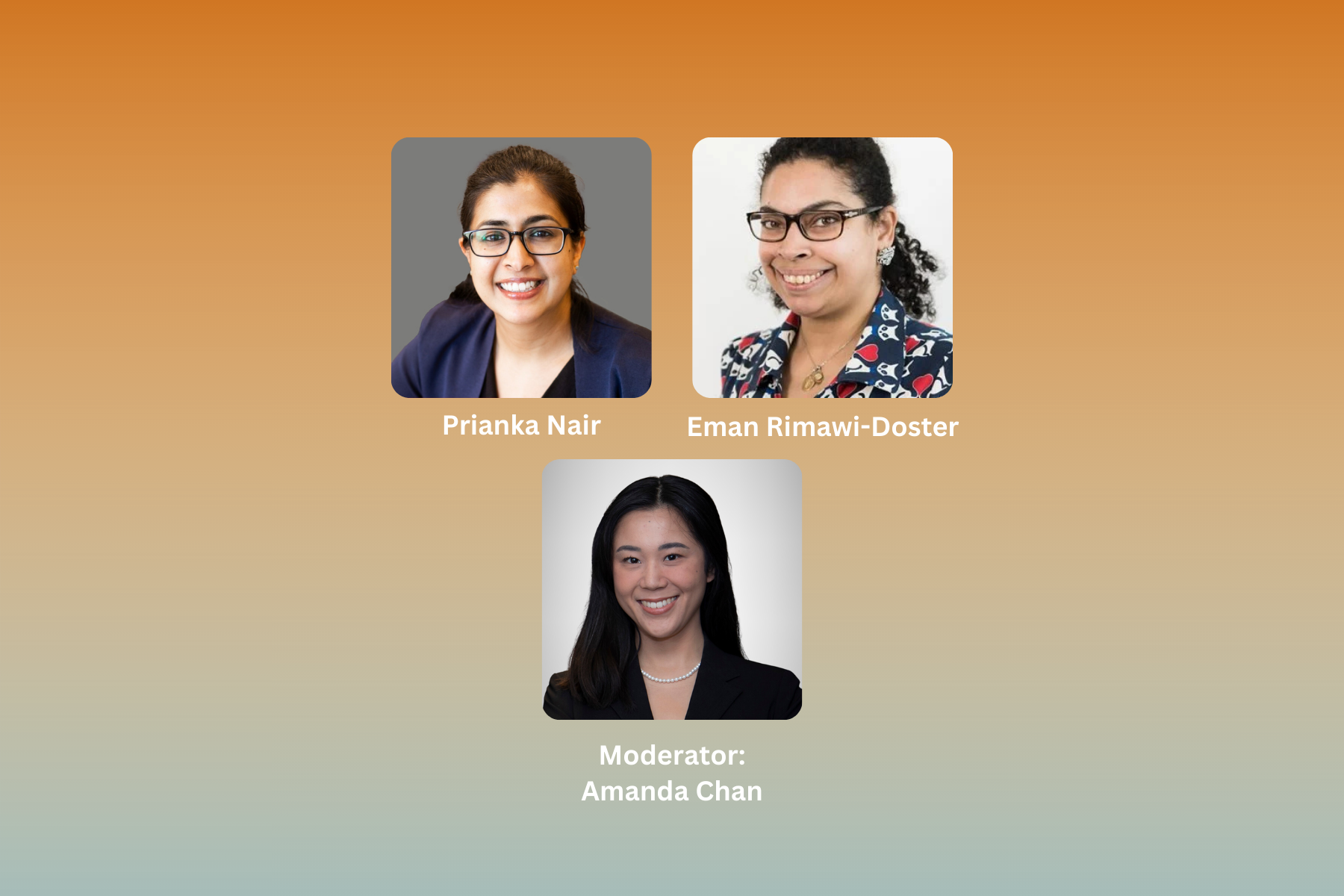
Disability Rights and Asian American Identity - Room W402
Speakers
Prianka Nair, Co-Director of the Bet Tzedek Civil Litigation Clinic, Cardozo Law School
Eman Rimawi-Doster, Senior Organizer, Disability Justice
Moderator
Amanda Chan, Associate Attorney, Outten & Golden
Description
This panel discussion will delve into the crucial topic of disability rights and its intersection with Asian American identity. This discussion aims to shed light on the unique challenges faced by Asian Americans with disabilities, the impact of their cultural identity on their experiences, and the broader implications for the community at large.
Through the following discussion points, the panelists will help the audience deepen their understanding of the intersection between disability rights and Asian American identity, to recognize the ongoing challenges, and to inspire action towards a more inclusive and equitable society for all.
Understanding Intersectionality: How do disability rights intersect with Asian American identity, and why is this intersection important?
Personal Narratives: Hear firsthand accounts from individuals who navigate the complex terrain of being both Asian American and disabled. Their stories highlight resilience, advocacy, and the ongoing fight for equality.
Policy and Advocacy: What are the current policies affecting this community, and what changes are needed to ensure equitable treatment and opportunities?
Community Support: The role of community organizations in supporting disabled Asian Americans and how solidarity can drive meaningful change.
Collective Power: The importance of banding together to harness our power as disabled Asian Americans in driving systemic change and building a supportive network.
Approved for 1.5 Diversity and Elimination of Bias credits (Non-transitional ONLY).
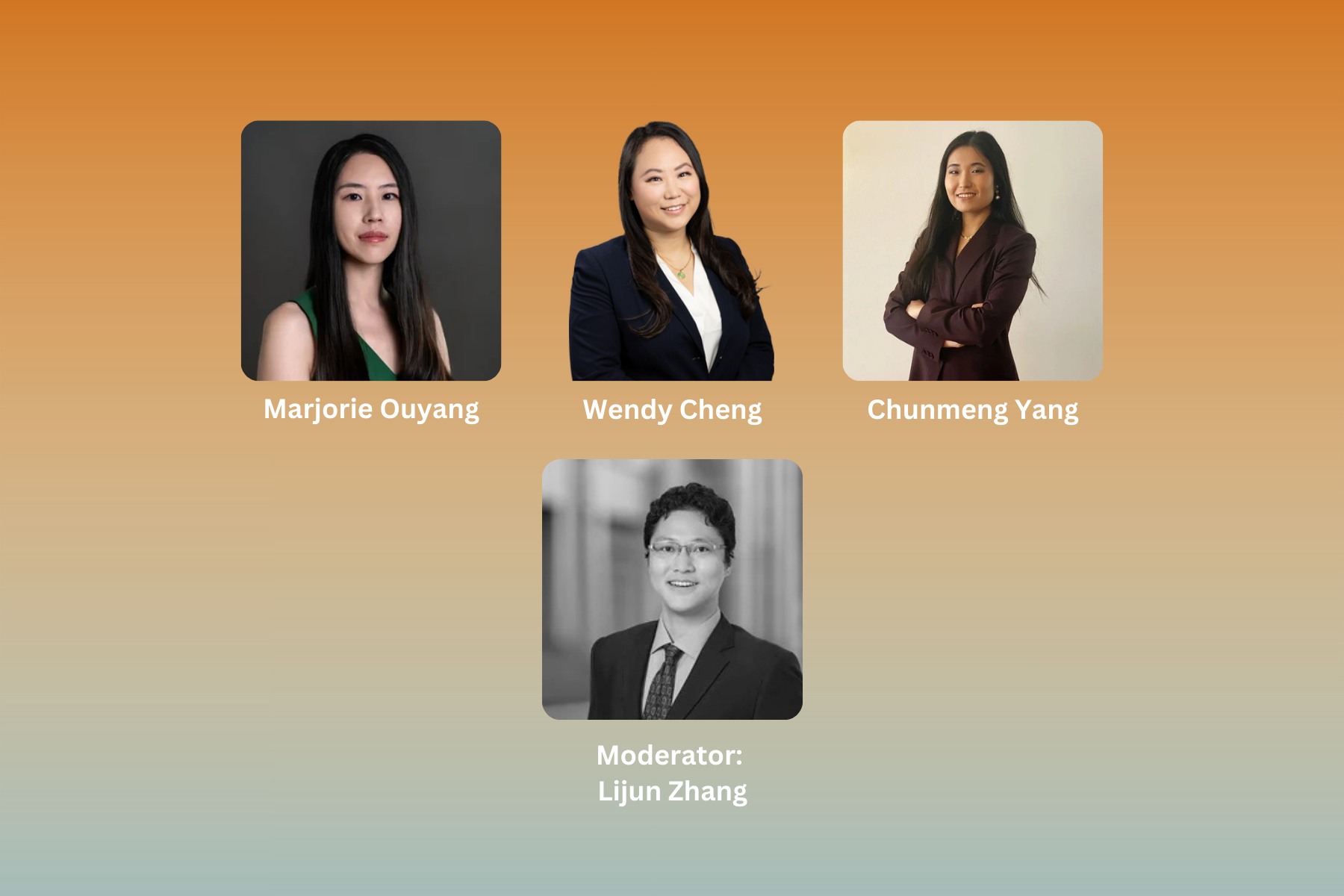
Emerging Trends in Intellectual Property Infringement - U.S. and China - Room W401
Speakers:
Marjorie Ouyang, Founding partner, Valley & Summit Law
Wendy Cheng, Partner, Kilpatrick Townsend & Stockton LLP
Chunmeng Yang, Of Counsel, Quinn Emanuel, Seattle Office
Moderator
Lijun Zhang, Litigator, White & Case LLP
Description
As businesses expand across borders, the risks and realities of intellectual property infringement continue to evolve. This panel will explore the latest developments in U.S. and Chinese IP enforcement, including trademark and copyright disputes, anti-counterfeiting strategies, cross-border litigation, arbitration, and recent case law shaping the IP landscape. Drawing from their own war stories and front-line experiences, the speakers will share insights on both defensive and offensive strategies that companies can use to protect and enforce their rights, while navigating the increasingly complex IP environment in two of the world’s most critical markets.
Approved for 1.5 Areas of Professional Practice credits (Transitional and non-transitional).
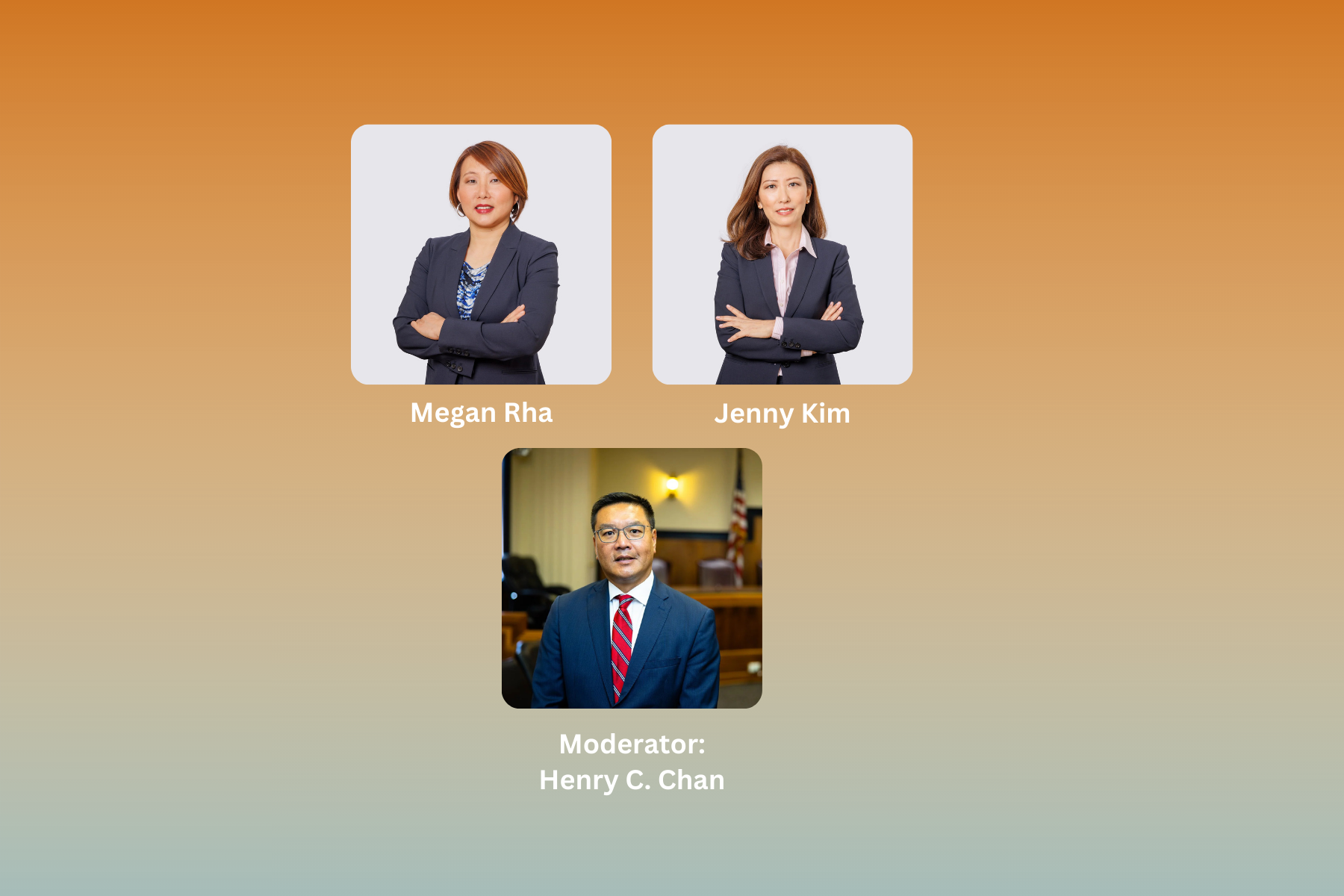
Long Lasting Attorney Partnerships - Strategies and Best Practices - Room W420
Speakers
Megan Rha, Partner, Rha Kim Grossman & McIlwain, LLP
D. Jenny Kim, Partner, Rha Kim Grossman & McIlwain, LLP
Moderator
Henry C. Chan, Co-Founder and Managing Partner, Wilson & Chan, LLP
Description
Practicing law while running a law firm as a small business is very demanding and challenging, and quite stressful. Having a law partner can make the journey more manageable, provided the partnership functions well. The proposed program intends to look at the best practices and strategies for starting and operating a successful and effective law partnership. The presenters will be Megan Rha and D. Jenny Kim of Rha Kim Grossman & McIlwain, LLP (“RKGM”) who will draw from their own law partnership that began almost 20 years ago.
Lessons from their decades-long practice will impart strategies, practical tools, and real-life anecdotes and reflections. Some of the lessons we will discuss during the presentation include:
Reminiscing together - how something begins can shape everything, so return to the origin often, remember what united us, and celebrate what continues to keep us together
Keeping each other grounded by remembering why we rely on one another
Being on the “same page” as we venture down different paths – addressing why we chose to go from two separate offices into one shared office
Building our strategies and best practices by assessing and appreciating our differences and similarities
Balancing the serious nature of practicing law with the entrepreneurial nature of operating and growing a business – how our partnership empowers us to take the leap, build our business, and fly
Cultivating strong interpersonal skills and mutual respect to sustain and grow our partnership – through frequent communication, shared vision, mutual appreciation, space to thrive independently, and equitable sharing of the workload
Approved for 1.5 Law Practice Management credits (Transitional and Non-Transitional).
